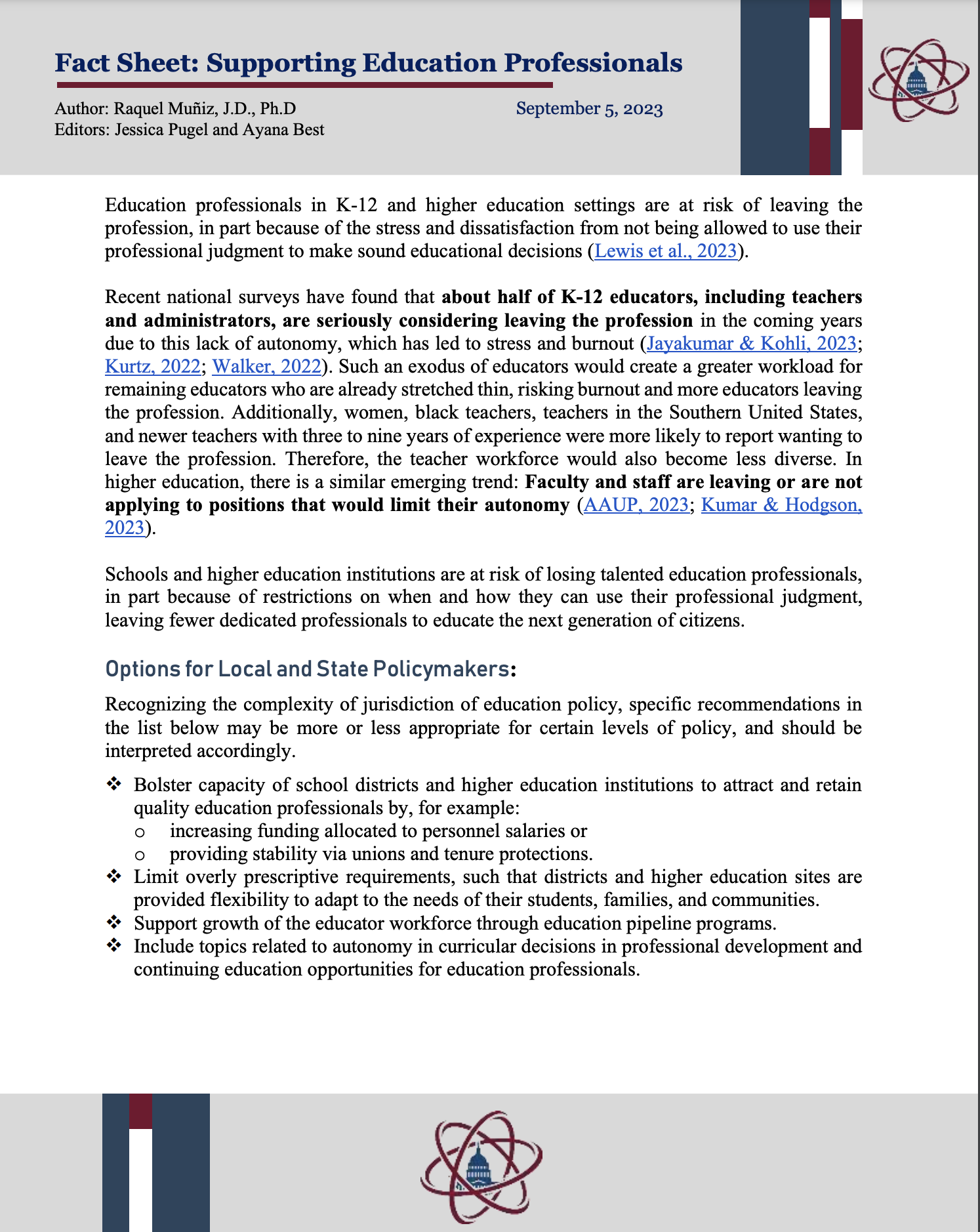
Education professionals in K-12 and higher education settings are at risk of leaving the profession, in part because of the stress and dissatisfaction from not being allowed to use their professional judgment to make sound educational decisions (Lewis et al., 2023).
Recent national surveys have found that about half of K-12 educators, including teachers and administrators, are seriously considering leaving the profession in the coming years due to this lack of autonomy, which has led to stress and burnout (Jayakumar & Kohli, 2023; Kurtz, 2022; Walker, 2022). Such an exodus of educators would create a greater workload for remaining educators who are already stretched thin, risking burnout and more educators leaving the profession. Additionally, women, black teachers, teachers in the Southern United States, and newer teachers with three to nine years of experience were more likely to report wanting to leave the profession. Therefore, the teacher workforce would also become less diverse. In higher education, there is a similar emerging trend: Faculty and staff are leaving or are not applying to positions that would limit their autonomy (AAUP, 2023; Kumar & Hodgson, 2023).
Schools and higher education institutions are at risk of losing talented education professionals, in part because of restrictions on when and how they can use their professional judgment, leaving fewer dedicated professionals to educate the next generation of citizens.
Options for Local and State Policymakers:
Recognizing the complexity of jurisdiction of education policy, specific recommendations in the list below may be more or less appropriate for certain levels of policy, and should be interpreted accordingly.
- Bolster capacity of school districts and higher education institutions to attract and retain quality education professionals by, for example:
- increasing funding allocated to personnel salaries or
- providing stability via unions and tenure protections.
- Limit overly prescriptive requirements, such that districts and higher education sites are provided flexibility to adapt to the needs of their students, families, and communities.
- Support growth of the educator workforce through education pipeline programs.
- Include topics related to autonomy in curricular decisions in professional development and continuing education opportunities for education professionals.
The Research-to-Policy Collaboration (RPC) works to bring together research professionals and public officials to support evidence-based policy. Please visit their website to learn more.
Key Information
RPC Website
Research-to-Policy Collaboration
Publication DateSeptember 7, 2023
Topic Area(s)Education and Child Development, Economy and Entrepreneurship
Resource TypeWritten Briefs
Share This Page
Education professionals in K-12 and higher education settings are at risk of leaving the profession, in part because of the stress and dissatisfaction from not being allowed to use their professional judgment to make sound educational decisions (Lewis et al., 2023).
Recent national surveys have found that about half of K-12 educators, including teachers and administrators, are seriously considering leaving the profession in the coming years due to this lack of autonomy, which has led to stress and burnout (Jayakumar & Kohli, 2023; Kurtz, 2022; Walker, 2022). Such an exodus of educators would create a greater workload for remaining educators who are already stretched thin, risking burnout and more educators leaving the profession. Additionally, women, black teachers, teachers in the Southern United States, and newer teachers with three to nine years of experience were more likely to report wanting to leave the profession. Therefore, the teacher workforce would also become less diverse. In higher education, there is a similar emerging trend: Faculty and staff are leaving or are not applying to positions that would limit their autonomy (AAUP, 2023; Kumar & Hodgson, 2023).
Schools and higher education institutions are at risk of losing talented education professionals, in part because of restrictions on when and how they can use their professional judgment, leaving fewer dedicated professionals to educate the next generation of citizens.
Options for Local and State Policymakers:
Recognizing the complexity of jurisdiction of education policy, specific recommendations in the list below may be more or less appropriate for certain levels of policy, and should be interpreted accordingly.
- Bolster capacity of school districts and higher education institutions to attract and retain quality education professionals by, for example:
- increasing funding allocated to personnel salaries or
- providing stability via unions and tenure protections.
- Limit overly prescriptive requirements, such that districts and higher education sites are provided flexibility to adapt to the needs of their students, families, and communities.
- Support growth of the educator workforce through education pipeline programs.
- Include topics related to autonomy in curricular decisions in professional development and continuing education opportunities for education professionals.
The Research-to-Policy Collaboration (RPC) works to bring together research professionals and public officials to support evidence-based policy. Please visit their website to learn more.

Key Information
RPC Website
Research-to-Policy Collaboration
Publication DateSeptember 7, 2023
Topic Area(s)Education and Child Development, Economy and Entrepreneurship
Resource TypeWritten Briefs
Share This Page
LET’S STAY IN TOUCH
Join the Evidence-to-Impact Mailing List
Keep up to date with the latest resources, events, and news from the EIC.




